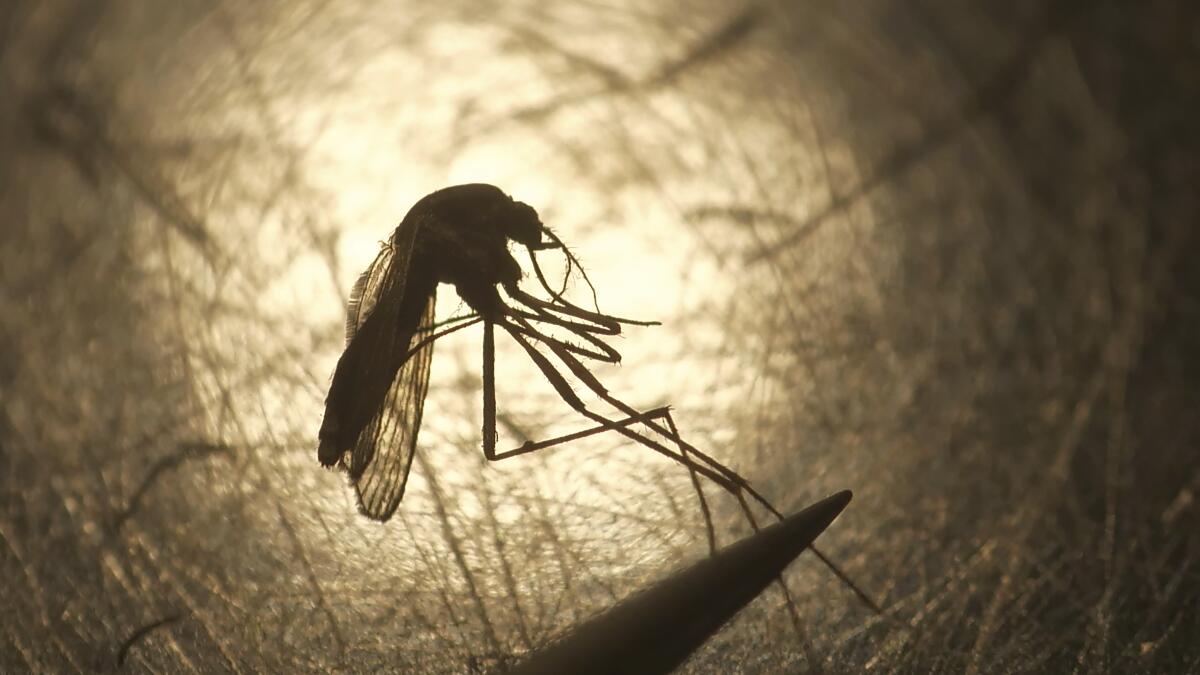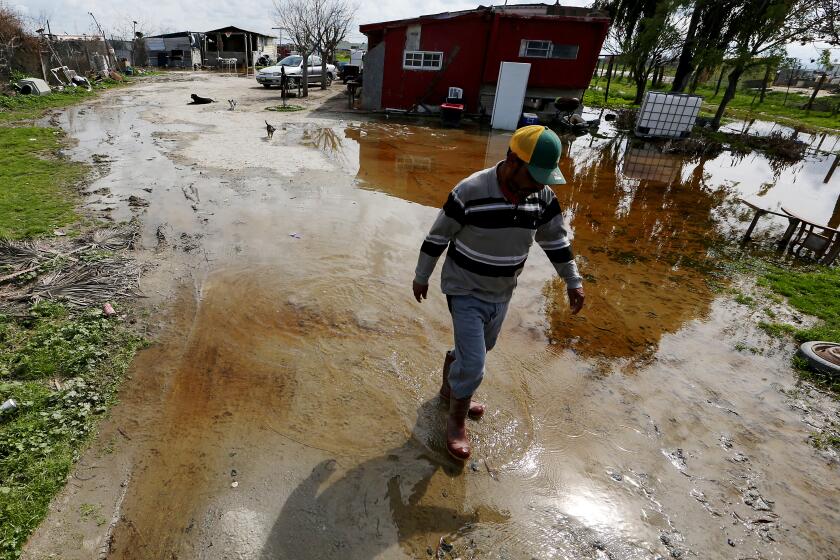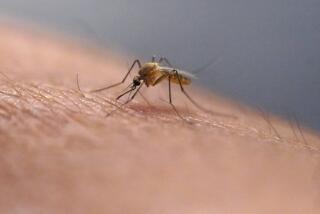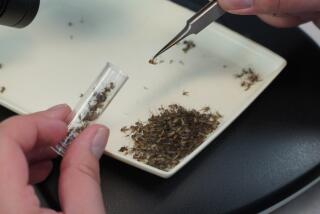How to stop your yard from becoming a mosquito breeding ground

- Share via
This winter’s downpours have brought more than much-needed water to Los Angeles County. They’ve also created a potential breeding ground for mosquitoes in your backyard.
The rainfall has helped flush from underground storm drains the debris and obstructions that typically produce large numbers of mosquitoes, said Steve Vetrone, the Greater Los Angeles County Vector Control District’s director of scientific-technical services. But residential sources such as unmaintained swimming pools and open containers (such as rain barrels, plant saucers and buckets) may contribute to an increase in mosquito populations, Vetrone said.
The return of pleasant weather could bring more than suntans as the deluge of storms has provided fertile ground for mosquitoes.
Vetrone urges residents to be vigilant around their homes and eliminate any sources of standing water.
The Times asked experts how to keep the flying leeches away, what to do when you’ve been bitten and why some people attract mosquitoes more than others. Here’s what they said.
What attracts mosquitoes
How do you know if your area will be inundated with leg biters?
The growth of a neighborhood’s mosquito population, Vetrone says, will depend on the availability of potential breeding sources.
According to the American Mosquito Control Assn., there are 30 different types of mosquitoes within the United States. While there are differences among them — for example, some feed during the day and others at night — they share a life cycle that is dependent on water to breed in.
Vector control agencies will take care of public sources such as gutters, underground storm drains, flood control channels and debris basis.
The district is calling on residents to eliminate potential sources around their homes and encourage their neighbors to do the same to reduce the number of mosquito breeding sources collectively.
You can start by identifying items on your property that can hold standing water. Standing water left untouched for at least seven days is a magnet for mosquitoes. Typical sites include birdbaths, old tires and clogged gutters.
The Greater Los Angeles County Vector District lists a number of backyard and household items that may be surreptitiously collecting standing water, such as portable basketball hoops, uncovered outdoor grills, potted plants with saucers and flower vases.
“Because mosquito larvae feed on decaying organic matter and other microorganisms, the water must be stagnant and contain some organic matter such as leaves, soil or grass clippings to support mosquito development,” said Daniel Markowski, American Mosquito Control Assn.’s technical advisor.
You can eliminate these breeding sites by draining or dumping the water, then blocking more from collecting there — for example, by turning over a bucket or covering the grill. Do this at least once a week.
Why do mosquitoes bite me and not other people?
Two other prime mosquito attractants are bare skin and dark clothes. So when you’re enjoying yourself outdoors, wear long sleeves, long pants and light-colored, loose-fitting garments.
“Dark colors are not recommended in prime skeeter habitats because they stand out more, particularly in regards to background and contrasts,” Markowski said.
We exude other chemical cues too, he said, including breath odors, bacteria on our skin and other aromas produced by humans.
“We are all different, and these different combinations are more or less attractive to different mosquito species,” Markowski said.
He said some studies have shown that certain blood types may be especially attractive to some species of mosquitoes. “I would surmise that the combination above, along with the blood type, is really what makes one person more attractive to a mosquito than others,” he said.
Your diet may also play a role in whether you get snacked on. Consuming foods such as bananas, avocados and grapes have shown to increase host-seeking by some mosquito species, but Markowski speculated that an individual’s metabolism is a bigger factor than the specific foods eaten.
Here are all the answers to the questions you might have about joining some of the action for MLB All-Star Game week in Los Angeles.
How to get mosquitoes to buzz off
The Greater Los Angeles County Vector District says one thing to do to prevent mosquito bites is to apply insect repellent with one of these active ingredients: DEET, picaridin, IR3535 (the trade name for ethyl butylacetylaminopropionate) or oil of lemon eucalyptus.
As with all products, Markowski said, it’s a good idea to treat a small area on the body first to ensure you don’t have an allergic reaction before applying the repellent broadly. Read the product label and follow all the usage guidelines.
The Centers for Disease Control and Prevention advises against spraying repellent under your clothing. It also suggests that if you’re using sunscreen, apply sunscreen first and insect repellent second.
The U.S. Environmental Protection Agency, meanwhile, has an online tool that helps you figure out what repellent would work best for you.
Saving water during California’s drought includes checking for leaks inside and outside. You’ll save money too. Here are some easy ways to find and stop leaks.
An alternative to chemical-based sprays or creams are ones with plant-based ingredients such as citronella, lavender and peppermint. Markowski said these ingredients are less effective than their synthetic counterparts, they can work for you if mosquitoes don’t find you powerfully attractive.
You can also try to make the outdoor area you’ll be hanging out in inhospitable to mosquitoes by setting up several tiki torches or other devices that diffuse repellent. But the efficacy of diffusers can vary according to the species of mosquito.
For example the Vector Control District says, citronella candles are effective at repelling mosquitoes only in the immediate radius around the candle, and only in the absence of a breeze.
It went on to say that Aedes mosquitoes prefer ankles, so the candles that are typically placed on tabletops won’t provide much coverage.
Try them one at a time until you find an approach that works best for you.
Certain plants can offer some level of protection to your patio too. These include citronella and a few other geranium varieties, marigolds, lemongrass, catnip, certain types of mint, lavender, and lantana. There are also common aromatic herbs that have limited ability to drive off mosquitoes, such as rosemary, garlic, basil, thyme and fennel. No, you do not have to wear the garlic around your neck.
If mosquitoes manage to bite you despite all these precautions, don’t scratch! Markowski said scratching can cause secondary infection and prolong the irritation. In extreme cases, people can scar themselves.
A anti-itch cream is typically all you’ll need to alleviate the discomfort. If you’re highly allergic to mosquitoes, he said, you may need a cream with Benadryl or similar antihistamine.
About The Times Utility Journalism Team
This article is from The Times’ Utility Journalism Team. Our mission is to be essential to the lives of Southern Californians by publishing information that solves problems, answers questions and helps with decision making. We serve audiences in and around Los Angeles — including current Times subscribers and diverse communities that haven’t historically had their needs met by our coverage.
How can we be useful to you and your community? Email utility (at) latimes.com or one of our journalists: Jon Healey, Ada Tseng, Jessica Roy and Karen Garcia.









